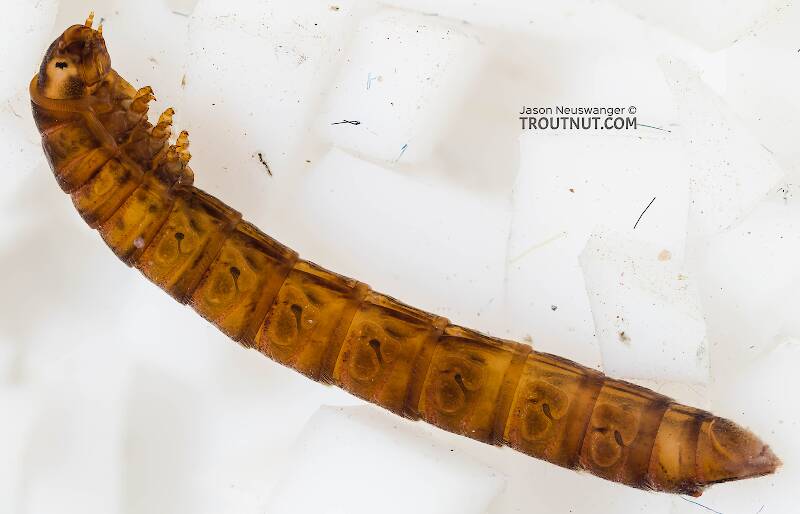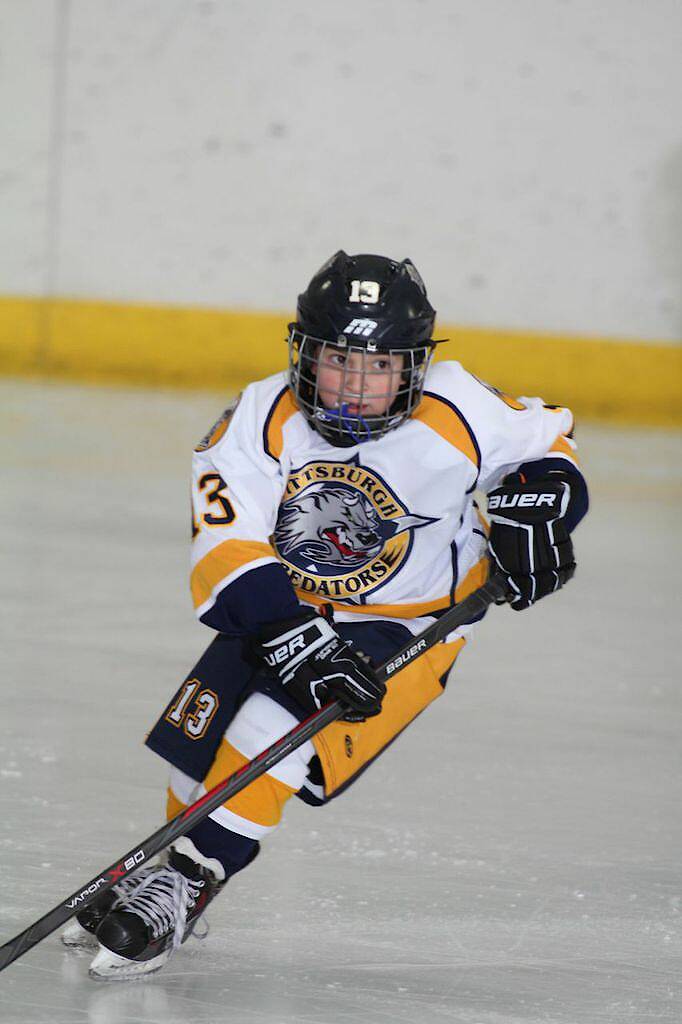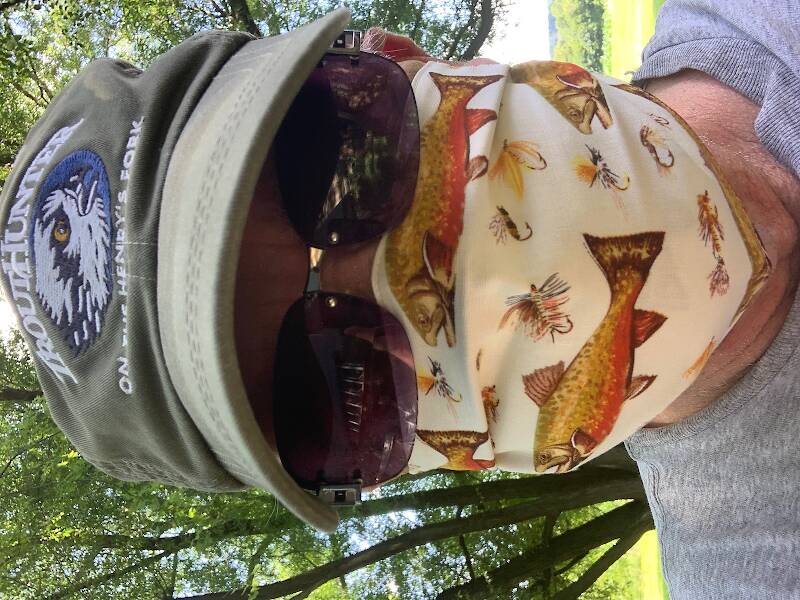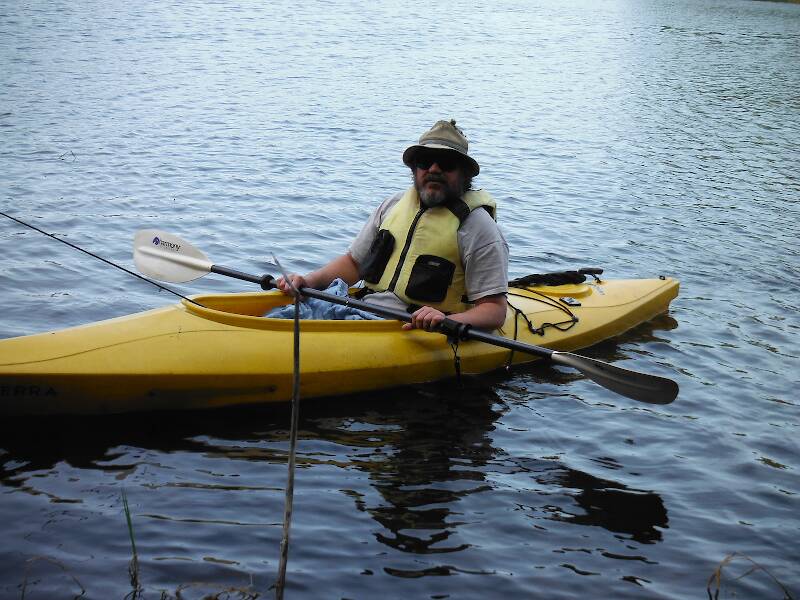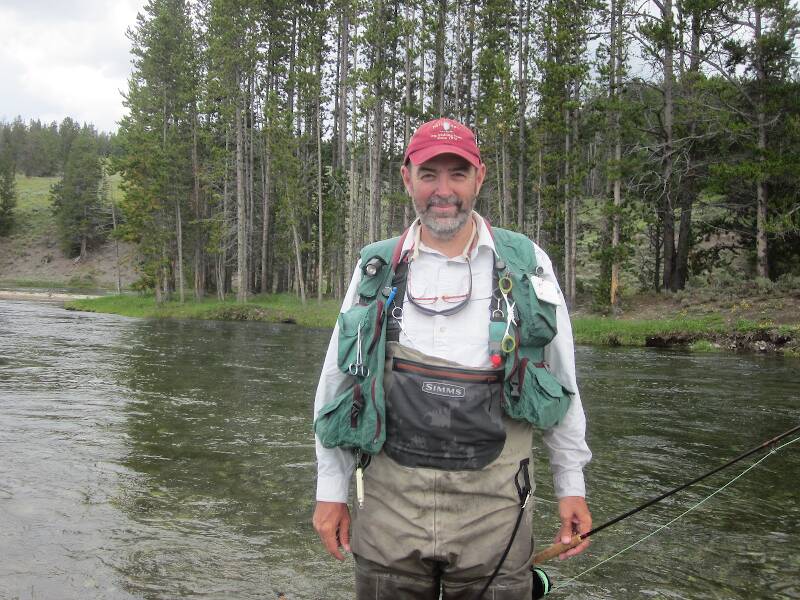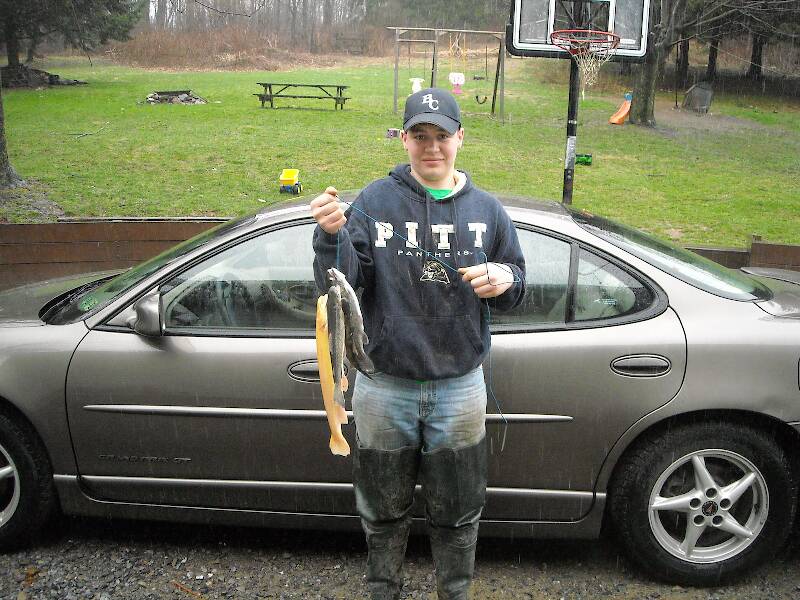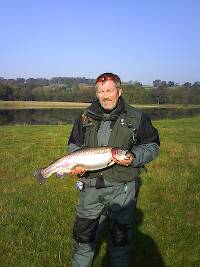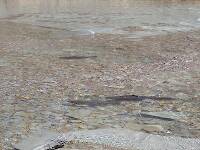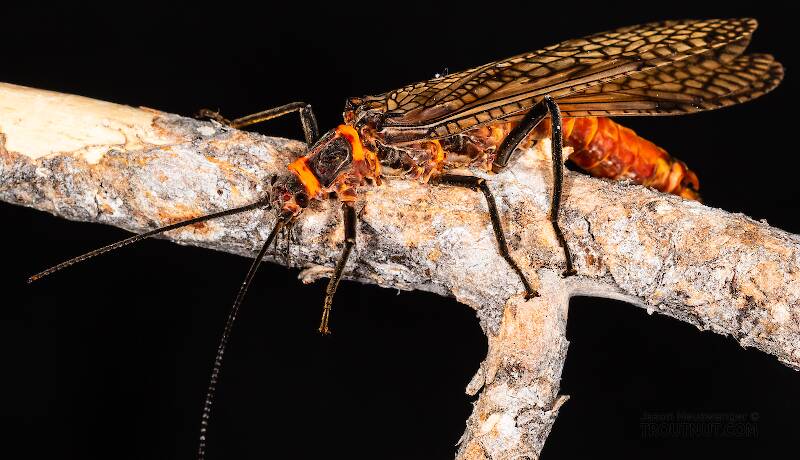
Salmonflies
Pteronarcys californica
The giant Salmonflies of the Western mountains are legendary for their proclivity to elicit consistent dry-fly action and ferocious strikes.
Featured on the forum

Troutnut is a project started in 2003 by salmonid ecologist Jason "Troutnut" Neuswanger to help anglers and
fly tyers unabashedly embrace the entomological side of the sport. Learn more about Troutnut or
support the project for an enhanced experience here.
Troutnut on May 23, 2010May 23rd, 2010, 1:07 pm EDT
For the last several months I've been working intensely on my research and preparing a talk for an international symposium on salmonid ecology in Luarca, Spain. It was an amazing meeting because it was small (around 100-200 scientists) and highly specialized, attended by most of the top researchers worldwide on trout and salmon behavior. The last time they held this symposium was 10 years ago, so I was really fortunate to get an opportunity like this right as I'm getting to the stage of my Ph.D. research where I've got some cool results to show.
And here are some of those results that I presented. I got a really positive response.
Part of the blog post linked there is about a behavior that hasn't seen as much attention from ecologists as it deserves: fish spitting out things they grab. The juvenile Chinook salmon I'm filming spit out more than half of the "prey" they capture, so they're basically using taste/feel as much as sight to determine what is or isn't prey. I think this is probably a common situation for small (young of the year) salmonids in rivers. It should get less common when the fish get larger because there's less debris of the same size as their food. However, Gary LaFontaine wrote about seeing adult trout do this in riffles during his snorkeling observations. It makes sense that they'd be more likely to do that in fast water when they've got less time to visually inspect things before grabbing them.
It makes you wonder how many times we really "fool" the fish with our flies, and how often they're just waiting to make the determination in their mouths, only to find that it's too late.
And here are some of those results that I presented. I got a really positive response.
Part of the blog post linked there is about a behavior that hasn't seen as much attention from ecologists as it deserves: fish spitting out things they grab. The juvenile Chinook salmon I'm filming spit out more than half of the "prey" they capture, so they're basically using taste/feel as much as sight to determine what is or isn't prey. I think this is probably a common situation for small (young of the year) salmonids in rivers. It should get less common when the fish get larger because there's less debris of the same size as their food. However, Gary LaFontaine wrote about seeing adult trout do this in riffles during his snorkeling observations. It makes sense that they'd be more likely to do that in fast water when they've got less time to visually inspect things before grabbing them.
It makes you wonder how many times we really "fool" the fish with our flies, and how often they're just waiting to make the determination in their mouths, only to find that it's too late.
Jason Neuswanger, Ph.D.
Troutnut and salmonid ecologist
Troutnut and salmonid ecologist
Dryfly on May 24, 2010May 24th, 2010, 5:14 pm EDT
Did you bring along any graphite sampling tools on your expeditons?
Gutcutter on May 25, 2010May 25th, 2010, 1:25 am EDT
so this explains why i miss the fish that clearly ate my fly... thank you jason for giving us all another excuse. "she didn't like the taste of my fly"
All men who fish may in turn be divided into two parts: those who fish for trout and those who don't. Trout fishermen are a race apart: they are a dedicated crew- indolent, improvident, and quietly mad.
-Robert Traver, Trout Madness
-Robert Traver, Trout Madness
Troutnut on May 25, 2010May 25th, 2010, 10:13 am EDT
I don't use hook-and-line sampling in my research. I would have to go through a fairly involved permitting process to capture live vertebrates for research. However, while my cameras are filming my research fish, I do have about an hour of free time to take a break, cease officially working, and fish for grayling in what happens to be one of the best grayling fisheries on the Alaskan road system.
The Alaska Department of Fish & Game includes a number of lucky bastards who get to do hook & line sampling for part of their jobs (it actually is the best scientific capture method in their situations, and they really do call it "hook & line sampling") in destinations that would cost most people $10,000+ to fly in and fish.
The Alaska Department of Fish & Game includes a number of lucky bastards who get to do hook & line sampling for part of their jobs (it actually is the best scientific capture method in their situations, and they really do call it "hook & line sampling") in destinations that would cost most people $10,000+ to fly in and fish.
Jason Neuswanger, Ph.D.
Troutnut and salmonid ecologist
Troutnut and salmonid ecologist
Wiflyfisher on May 25, 2010May 25th, 2010, 10:26 am EDT
Jason, I wish the Hayward DNR office would ask for some volunteers for "hook & line sampling". I could then give my better-half a legitimate reason why I have to go fishing all the time. :)
John S.
https://WiFlyFisher.com
https://WiFlyFisher.com
Jmd123 on May 28, 2010May 28th, 2010, 5:29 pm EDT
I guess the part about the juvenile chinooks - let's call them proxies for all the fish we go after - spitting out half of what they bite on doesn't surprise me all that much. For most fish, with the exception of things like catfish that quite literally have taste organs all over their bodies (not to mention whiskers loaded with same), the only way a fish can "sample" it's environment is with it's mouth. They don't have hands or claws they can pick up things to examine them with, and don't have tongues like snakes that can chemically sample the air or water (though they do have nostrils and some sence of smell). So, they taste whatever looks interesting to them, in flowing waters as well as still waters. I have been seeing this with bluegill & pumpkinseed on their spawning beds - some fish pick up and spit out a fly before you can even come close to setting the hook, and this is on BLUEGILL!
Sure explains all of those missed fish, bad hook sets that get thrown, foul hooked fish, etc....
Jonathon
Sure explains all of those missed fish, bad hook sets that get thrown, foul hooked fish, etc....
Jonathon
No matter how big the one you just caught is, there's always a bigger one out there somewhere...
Troutnut on Jun 1, 2010June 1st, 2010, 9:34 am EDT
Sure explains all of those missed fish, bad hook sets that get thrown, foul hooked fish, etc....
Also helps explain all the fish caught on bad flies!
Jason Neuswanger, Ph.D.
Troutnut and salmonid ecologist
Troutnut and salmonid ecologist
Oldredbarn on Jun 1, 2010June 1st, 2010, 1:30 pm EDT
"Also helps explain all the fish caught on bad flies!" Jason, Jason, Jason! Are you trying to remove the glamour and romance from our fair sport???
This kind of reminds me of a story that Jack Gartside (I think it was) told of watching a trout suck in a cigarette butt he had tossed in to the river in Yellowstone Park.
Anyone who raised fish as a kid has watched them "play" with their food. I had guppies & mollies and when you fed them they would inhale a chunk of food and spit it out and repeat until it was satisfied with the size or whatever.
I guess we all have read of fish taking a nymph imitation and spitting it out without the angler even knowing it...I guess this may be why some wise guy invented strike indicators...
Oh well...I guess I really only need one fly and could leave everything else back in the room...This would sure save my poor back!
Great video and how did you get the beaver to play along?
Also, Congrats on your presentation!!! We may have to change the name of this site to Chinook-Nut!
Spence
This kind of reminds me of a story that Jack Gartside (I think it was) told of watching a trout suck in a cigarette butt he had tossed in to the river in Yellowstone Park.
Anyone who raised fish as a kid has watched them "play" with their food. I had guppies & mollies and when you fed them they would inhale a chunk of food and spit it out and repeat until it was satisfied with the size or whatever.
I guess we all have read of fish taking a nymph imitation and spitting it out without the angler even knowing it...I guess this may be why some wise guy invented strike indicators...
Oh well...I guess I really only need one fly and could leave everything else back in the room...This would sure save my poor back!
Great video and how did you get the beaver to play along?
Also, Congrats on your presentation!!! We may have to change the name of this site to Chinook-Nut!
Spence
"Even when my best efforts fail it's a satisfying challenge, and that, after all, is the essence of fly fishing." -Chauncy Lively
"Envy not the man who lives beside the river, but the man the river flows through." Joseph T Heywood
"Envy not the man who lives beside the river, but the man the river flows through." Joseph T Heywood
Vinlflyfish on Jun 5, 2010June 5th, 2010, 1:44 pm EDT
hey im doing research on native brook trout in Pennsylvania can u give me some tips
trout; a mans best friend
Vinlflyfish on Jun 5, 2010June 5th, 2010, 2:30 pm EDT
jason can u give me some tips
trout; a mans best friend
Troutnut on Jun 6, 2010June 6th, 2010, 6:52 am EDT
Vinnie you're going to have to be more specific with your posts in general. "Some tips" doesn't really help point me to what you need to know.
Jason Neuswanger, Ph.D.
Troutnut and salmonid ecologist
Troutnut and salmonid ecologist
Quick Reply
Related Discussions
Topic
Replies
Last Reply


